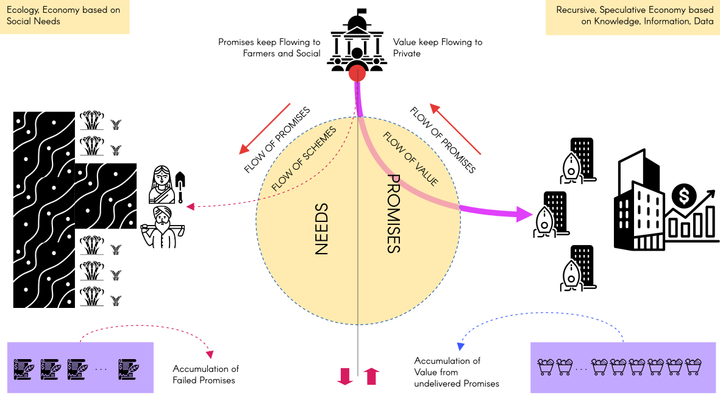Online Education in the times of COVID-19 and Beyond – Part 1
Author : Jayasree Subramanian.
The Novel Coronavirus disease pandemic, also referred to as COVID-19 pandemic or simply as COVID-19, spreading across the world has transformed it like never before. In an effort to contain the spread of the disease, many countries imposed a partial or full lockdown and the Indian government too imposed a lockdown from 24th March, 2020, forcing all the educational institutions to suspend their teaching-learning activities. This lockdown along with the coronavirus scare itself traumatised children and youth across all socio-cultural, economic and regional divides, as there was and is very little known about who will be the next victim of the virus, who will survive and who will not and when the lockdown will end, allowing them to get out of the confinement at their homes and meet their dear friends and teachers. Never before has closing of educational institutions meant fear, isolation and boredom for students. Those from the socio-economic margins faced severe economic and emotional consequences due to the lockdown in addition to fear, isolation and boredom.

The educational institutions responded to the lockdown with anxiety as the academic year had not yet ended and annual/semester-end examinations hadn’t been held yet; in fact, for several universities the even semester had only reached the half-way mark. While many schools wound up the teaching-learning activities at least at the elementary school level after the lockdown was announced, some schools, junior colleges and many institutions of higher education followed up the face-to-face classroom teaching with online teaching and learning during the lockdown period.
The University Grants Commission set up an expert committee to study the situation and suggest appropriate measures in the wake of the lockdown and the committee recommended that even if it means pushing the academic calendar to a later date, teaching -learning process should be continued using online modes, the prescribed syllabus should be covered and there should be no compromise on the quality of knowledge imparted to the students (UGC, 2020). And the NCERT evolved a separate Alternative Academic Calendar (AAC) for primary, upper primary and secondary grades. Stating that ‘(f)ortunately, almost everyone owns a mobile phone; additionally, many people use it for social media such as SMS, WhatsApp, Telegram, Facebook, Twitter as well as Google mail and Google Hangout’, the alternative academic calendar appeals to the teachers to use Information and Communications Technology (ICT) largely and, wherever there is no internet connectivity, to use SMS and voice calls (NCERT,2020).
Should we and can we afford to fall behind? From the urgency with which we have been forced to switch over to online education, the answer from the state institutions in charge of education is a clear ‘NO’!
Several institutions of higher education – almost all the private universities including BITS, many IITs, IISERs, central universities and some state universities – readily complied with the UGC’s call for conducting online classes. Teachers were quickly trained to teach via digital classrooms using online platforms such as Zoom. Some private universities have already decided that they will conduct online examinations though there has been a lot of resistance to online examinations. Delhi University students and faculty members have been protesting against online examinations saying it is unfair to students who could not attend the online classes. Many institutions are gearing up for online teaching for the coming semester as the present situation might continue till such time as it is safe for colleges and universities to resume face-to-face teaching-learning activities in the classroom.
Schools are less likely to reopen anytime soon as parents do not feel it would be safe to send their children to school at a time when the number of people affected by the coronavirus is only increasing day by day. As in the case of higher education, many private schools have also caught onto the online teaching bandwagon and have called upon the teachers to take classes, assign students homework, check their assignments, make the students do projects and conduct online quizzes. In many schools in urban settings at least, the class sizes are cut down to not more than 20 students per session so that teachers communicate with them. This means they need to now teach the same content in two or three batches to ensure all the students have a chance to learn. In some schools there is also micro-managing to ensure that two children from the same home do not have to attend classes at the same time. Middle class and upper middle-class mothers and the school teachers teaching their children are occupied with thinking about the timetable, classes and homework. Teachers feel they are more over-worked now than they used to be in face-to-face teaching in a classroom. Part of the reason for the additional stress teachers feel has to do with the fact that sometimes parents sit through the online classes along with the students and come back with comments, criticisms and complaints. Teachers in the government-run schools attend webinars and are busy preparing teaching-learning material that they can use for online teaching.
All these would mean that, as far as the state machinery and the educational institutions are concerned, it is as if the lockdown due to COVID-19 did not make any substantial difference to the lives of the teachers and learners, and it is nearly business as usual. In other words, the state seems to have chosen to overlook the immense suffering caused to a large number of people because of the lockdown and operate under a comfortable myth that the teachers and learners are all safe and secure in their homes, waiting to resume the teaching-learning activities by other means as direct teaching-learning activities have been suspended. Pretending that it is business as usual might allow one to belong with those who matter! After all, if several other countries – particularly countries where a section of our students dream of pursuing higher studies – have met the challenge posed by lockdowns by shifting to online teaching and virtual classrooms, should we and can we afford to fall behind? From the urgency with which we have been forced to switch over to online education, the answer from the state institutions in charge of education is a clear ‘NO’!
However, transition to online education raises a series of questions some of which are specific to the present context of the country going through the pandemic and the consequences of the lockdown, and some of which are general:
- Considering the ways in which the lockdown has changed the experience of childhood and transformed the everyday life of a significant number of learners and teachers, what scope does online education have to reach these learners and what burden would it impose on teachers?
- In the changed situation imposed by the lockdown, how would online education take note of the changes imposed on the everyday lives of women, girl children and gender nonconforming children?
- Would the state be able to ensure equitable online education for all or would a huge section of students, who otherwise might have attended school regularly, be left behind in the process?
- Whose interest would online education really serve and at what cost?
- How does online education transform the teaching-learning activities, the scope for peer learning and the teacher-student relationship, in moving from the ambience of the physical classroom to a virtual classroom?
- Would the epistemological frameworks and philosophical considerations within which knowledge transaction happens in a physical classroom placed within an educational institution carry over to the context of online education in a virtual classroom?
- Would online education be able to do justice to the aims of education as outlined in the Constitution and policy documents? Would online education be able to offer learners what schooling and physical learning in a university offer?
- Can we think of some alternatives to online education that will meet the intellectual and emotional needs of the children and youth trapped at home because of the lockdown?
While the lockdown due to COVID-19 pandemic is the context for exploring online education the world over, it must be noted that it could well serve as a pretext for bringing in online education in a big way at least at the level of higher education. It is therefore important to try and understand the larger forces that are at play in setting online education in motion in our context and how they are linked to the phenomenon of online education emerging in the global arena.
CONTINUE TO PART 2 OF THE SERIES
Acknowledgement:
I would like to thank Senthil Babu, Kishor Bhat, Neeraja Budhey, Kishore Darak, Shreya Khemani, Anupama Pradeepan, and Tulsi Srinivasan for their valuable comments and suggestions. I would also like to thank Nityanand Rao for meticulous proof reading in a remarkably short time.
Reference:
[1] UGC (2020) https://www.ugc.ac.in/pdfnews/4276446_UGC-Guidelines-on-Examinations-and-Academic-Calendar.pdf
[2] NCERT (2020) Alternative Academic Calendar, http://ncert.nic.in/aac.html

